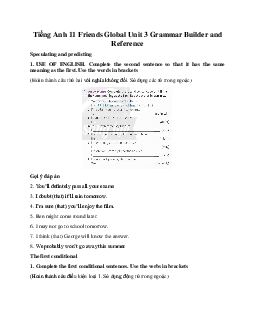



Preview text:
Tiếng Anh 11 Friends Global Unit 3 3C Listening
1. SPEAKING Describe and compare the photos. What are the similarities and
differences between the activities? Use the words below to help you.
(Mô tả và so sánh các bức ảnh. Những điểm tương đồng và khác biệt giữa các hoạt động
là gì? Sử dụng các từ dưới đây để giúp bạn.) Gợi ý đáp án
Looking at the pictures I can see they are running in the desert and the second picture
shows the man who is staying in a tent on a cold mountain covered with a lot of snow.
The people in the first picture, I guess they are taking part in a running activity because
they have numbers on their T-shirts. They look really tired because of the hot weather
and I guess they are becoming dehydrated. By contrast, in the second picture, the weather
is frostbite because the main color of the picture is the color of snow. The man is sitting
on the top of the mountain with a high altitude. He is also wearing a face mask to supply
oxygen. I guess he is a climber, and he wants to conquer this mountain.
2. Read the Listening Strategy. Then try to say the numbers and measurements below. Listen and check.
(Đọc Chiến lược nghe. Sau đó cố gắng nói các con số và phép đo dưới đây. Nghe và kiểm tra.)
3. Read and listen to the article. Complete the article with numbers and
measurements from exercise 2.
(Đọc và nghe bài viết. Hoàn thành bài viết với các số và phép đo từ bài tập 2.) Gợi ý đáp án 1. -400C 2. 50C 3. 150C 4. 50% 5. 57% 6. 4,500 7. 1/5 8. 1/10 Nội dung bài nghe
There are many amazing stories of human survival, but actually our bodies are very
fragile and do not cope well with extremes. Polar explorers can cope with temperatures of
−40°C, but only if they keep warm. Most people will collapse if their body temperature
drops by only 5°C, and if it drops by 15°C, they’ll die. Heat can be just as dangerous.
Temperatures of 35°C are safe provided humidity is not above 50%. High altitudes are
dangerous too. We pass out when the pressure falls below 57% of normal atmospheric
pressure. This happens at about 4,500 metres. Climbers can go higher because their
bodies gradually get used it, but no one survives for long at 8,000 metres. At high
altitudes, lack of oxygen is another problem. At ground level, about 1/5 of the air is
oxygen. If that falls below 1/10, we die.
4. Listen to an interview with a scientist. Which of the people he talks about tested
the body's limits deliberately?
(Nghe cuộc phỏng vấn với một nhà khoa học. Ai trong số những người mà anh ấy nói về
đã cố tình kiểm tra giới hạn của cơ thể?) Gợi ý đáp án Randy Gardner
5. Read the sentences aloud, paying attention to the numbers. Then listen again and
decide whether the sentences are true or false. Write T or F and correct the false sentences.
(Đọc to các câu, chú ý đến các con số. Sau đó nghe lại và quyết định xem câu đó đúng
hay sai. Viết T hoặc F và sửa các câu sai.) Gợi ý đáp án 1. F 2. T 3. F 4. T 5. F
6. PRONUNCIATION Listen and mark the words that are stressed in the sentences
from exercise 5. Then practise saying the sentences yourself.
(Nghe và đánh dấu những từ được nhấn trọng âm trong các câu ở bài tập 5. Sau đó tự luyện nói các câu đó.) Gợi ý đáp án
1. When a Russian space CAPSULE had a major PROBLEM in 1971, the
COSMONAUTS DIED in less than 30 SECONDS.
2. In 1966, a SCIENTIST PASSED out after 15 SECONDS in a VACUUM.
3. THE SCIENTIST PASSED out for 27 SECONDS.
4. In the 1960s, Randy Gardner STAYED awake for more than 250 HOURS.
5. After STAYING awake for so long, Randy Gardner then SLEPT for almost 50 HOURS.
7. SPEAKING Discuss the questions in pairs.
(Thảo luận các câu hỏi theo cặp.) Gợi ý đáp án
A: Have you ever been awake all night or most of the night? If so, when/where/why?
B: Yes, I have. I remembered when I was in grade 9, I usually stayed up late until 2.00 to
3.00 A.M. to do my homework as well as prepare for my big examination to enter high
school. It was really tiring and stressful.
A: Have you ever felt very cold? If so, when/where/why?
B: Yes, I have. That is when I went to Da Lat last year. Because I live in Ho Chi Minh
city, I get used to hot weather. Therefore, when I came to Da Lat, the weather was so
low, just about 15 degrees Celsius. I felt extremely cold.
A: Have you ever experienced high altitude?
B: No, I haven't. You know I'm a kind person who is very scared of heights. I also don't
have any intention to try it one time in the future.




